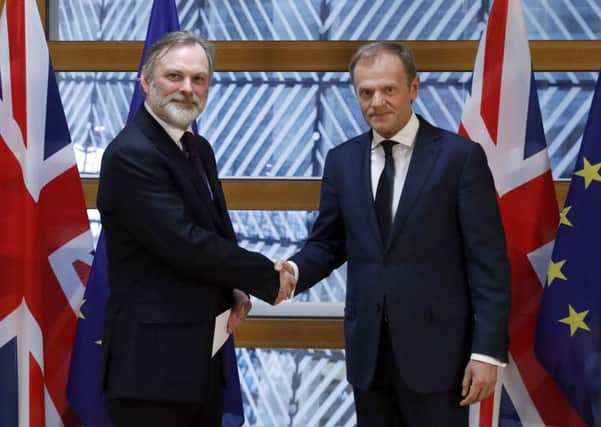Brexit: ministers play down row over security cooperation


Brexit Secretary David Davis insisted that his counterparts on the continent had praised the “positive” letter the Prime Minister sent to invoke Article 50, and it was simply stating that a replacement for current crime and security measures would need to be negotiated.
Critics accused the Prime Minister of trying to make a trade-off between security and commerce by mentioning the crime-fighting measures alongside a trade deal in her letter.
Advertisement
Hide AdAdvertisement
Hide AdBut Mr Davis said: “I spent all of yesterday afternoon on the telephone talking to my opposite numbers in the Parliament, in the commission, around all the member states.
“Virtually all of them said spontaneously, it’s a very positive letter, the tone was good, and so on.”
He told ITV’s Good Morning Britain: “One part of the deal is the justice and home affairs strand, we currently have arrangements for exchanging information, for arrest warrants, for Europol and all those things.
“We will need to replace that with something else because that will go when we leave the European Union.”
Mr Davis said it was a “negotiation” and “the other side might want to change things too”.
The reference to security caused concern in Brussels.
Asked if he thought Mrs May was engaged in “blackmail”, the European Parliament’s co-ordinator for Brexit Guy Verhofstadt said: “I try to be a gentleman, so towards a lady I don’t even use or think about the word ‘blackmail’.”
But Mr Davis played down the issue, saying: “Guy Verhofstadt called it blackmail, let’s not say everybody did.”
Work and Pensions Secretary Damian Green said the row was a “misunderstanding”.
Advertisement
Hide AdAdvertisement
Hide AdThe two issues had been mentioned side by side because they were “all bound up in our membership of the European Union”, he said.
“It’s not a threat, I think that’s the misunderstanding,” he told BBC Two’s Newsnight. “It’s absolutely not a threat.”
The next stage of the Brexit process will see plans set out to repatriate more than 40 years of powers back to Westminster, with the publication of the details of the Great Repeal Bill.
The white paper - Legislating for the United Kingdom’s withdrawal from the European Union - will set out how the Government will deal with EU laws that cannot be easily converted.
Secondary legislation, known as statutory instruments, will be used to make technical changes, with up to 1,000 pieces expected, nearly as many as MPs and peers usually deal with in an entire parliament.